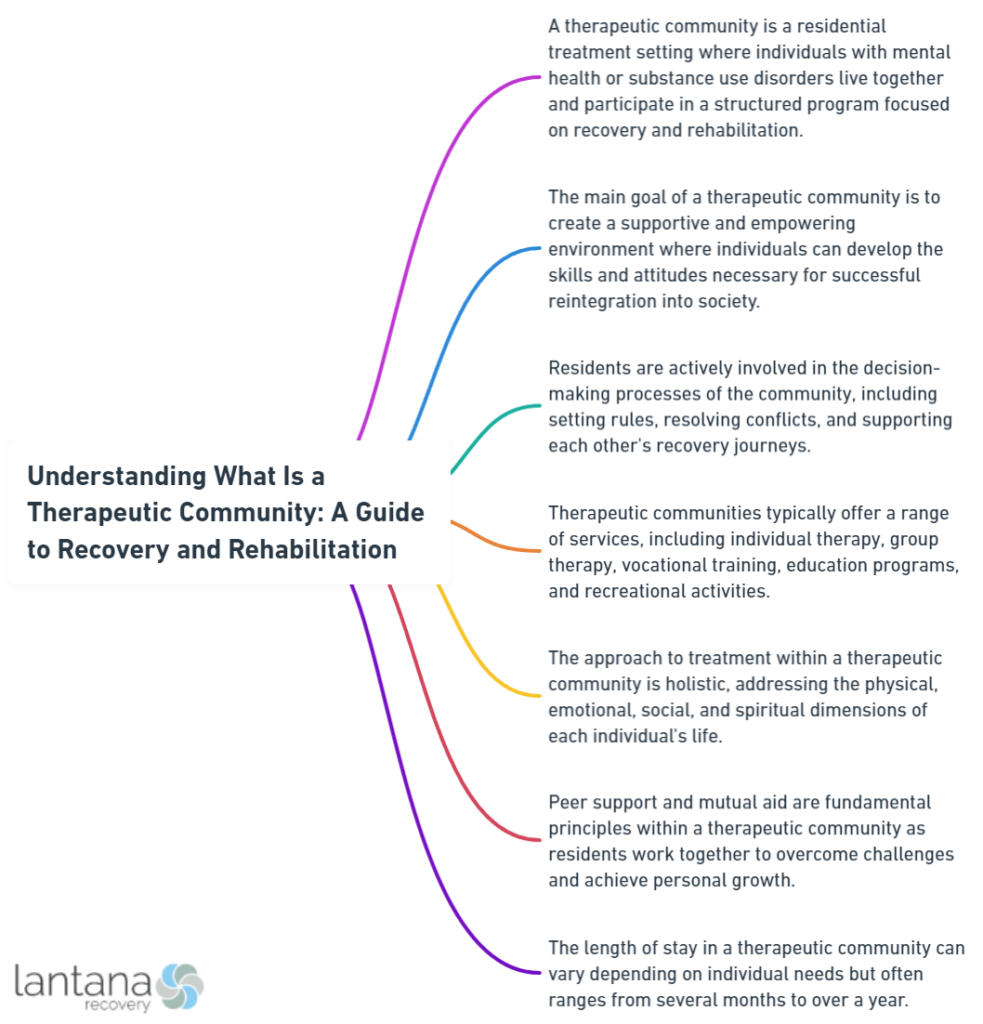What is a therapeutic community? It’s a rehabilitative setup where individuals work together to overcome challenges like addiction or mental health issues, tapping into the power of collective healing and personal accountability. Here, we’ll unpack how these communities operate, the principles they stand on, and the impact they have on those seeking a path to recovery.
Key Takeaways
- Therapeutic communities are structured group therapy environments aimed at treating long-term mental illness, personality disorders, and drug addiction through shared responsibility, mutual support, and residential programs that focus on changing negative cognitive and behavioral patterns.
- The effectiveness of therapeutic communities is well-supported by research, showing benefits in reducing substance use, lowering relapse rates, improving psychological functioning, and being cost-effective, particularly for those with severe addiction issues and co-occurring disorders.
- Adaptations of therapeutic communities meet the specific needs of diverse populations such as those in correctional facilities and outpatient settings, reflecting their versatility and capacity to evolve while maintaining their core principles and efficacy in treatment and rehabilitation.
Defining a Therapeutic Community

The therapeutic community is a group therapy method designed to address conditions such as long-term mental illness, personality disorders, and drug addiction. It emphasizes shared responsibility and mutual support among participants. The primary psychological and social goals of a therapeutic community revolve around changing negative patterns of thinking, behavior, and feeling, and developing the attitudes and values necessary for a responsible, drug-free lifestyle. Central to this approach is the residential setting, where clients and therapists live together, utilizing group psychotherapy and practical activities based on milieu therapy principles.
These communities operate on the understanding that drug abuse is a comprehensive disorder affecting the whole person. Therefore, recovery is facilitated by a social context and peer community, which promote right living. This makes therapeutic communities an effective tool in substance abuse treatment.
Key Principles
At the heart of therapeutic communities are core values of self-help, mutual support, and shared responsibility, reflecting their humanistic principles. In a therapeutic community, clients are actively involved in decision-making, reinforcing the key principles of democracy and shared responsibility.
Mutual self-help plays a pivotal role in these communities, with peers acting as role models and supportive friends during the recovery process. Furthermore, a culture of enquiry is fostered, where individuals are encouraged to:
- Reflect
- Question
- Improve self-awareness
- Empower personal responsibility

The “Community as Method” Approach
When it comes to the “Community as Method” approach, every interaction within a therapeutic community is designed to be a learning moment. This approach emphasizes that clients are co-facilitators in both their own recovery and that of their peers, fostering a sense of shared responsibility for the community’s operation.
The importance of therapeutic communities in psychiatry is substantial, constantly prompting fundamental questions about how mental health is managed and emphasizing growth through social interactions. Therapeutic communities have evolved to specifically address multifaceted psychological wounds related to addiction, requiring individuals to undergo lifestyle and identity changes, underpinned by the principles established in the Northfield experiments.
Alcohol Rehab South Carolina
If you or someone you know is struggling with alcohol addiction in South Carolina, seeking professional help from reputable alcohol rehab facilities is crucial. South Carolina offers a range of treatment options tailored to individuals’ needs, including inpatient and outpatient programs, counseling, and support groups. These facilities employ experienced professionals who understand the complexities of alcohol addiction and provide personalized care to help individuals overcome their dependency. Additionally, many alcohol rehab centers in South Carolina incorporate evidence-based practices and holistic approaches to address not only the addiction itself but also the underlying factors contributing to it. By committing to a comprehensive treatment plan within a supportive environment, individuals can embark on the journey to sobriety and lead fulfilling lives free from alcohol dependence.
The Origins and Evolution of Therapeutic Communities

The origins of therapeutic communities can be traced back to:
- The moral treatment movement of the 18th and 19th centuries, which emphasized humane psychosocial care and moral discipline
- The Northfield experiments between 1942 and 1948, which significantly influenced the development of therapeutic communities as we know them today
- Visionaries such as Bion, Rickman, Bridger, Main, and Foulkes, who further developed the ideas
While the United States focused on drug and alcohol dependence, Britain developed therapeutic communities to treat moderate to severe personality disorders and complex emotional issues, reflecting variations adapted to local needs. Despite societal shifts towards individualism during the 1980s and 1990s, therapeutic communities have learned to continually evolve and adapt to avoid institutionalization.
Early Influences
Historically, the ‘moral treatment’ movement greatly influenced the foundation of therapeutic communities, prioritizing a healthy environment, warm relations, and the importance of work. During the Enlightenment, a shift towards a more psychological understanding and the fostering of therapeutic environments for mental illness treatment took place, which contributed to the ethos of therapeutic communities.
Leaders of the moral treatment movement, such as Philippe Pinel in France and William Tuke in England, were pivotal in reforming asylum conditions, laying the groundwork for therapeutic community methodologies. Later, in the 20th century, key figures like Thomas Main and Maxwell Jones advanced the development of these communities based on moral treatment principles, coining the term ‘therapeutic community’.
Global Expansion
Therapeutic communities have been successful in achieving rehabilitation and patient satisfaction in Britain as well as internationally. They have demonstrated positive outcomes in both settings. Despite their global reach, these communities maintain the foundational perspective, approach, and components, including using ‘community as a method’ to treat substance use and personality disorders.
The concept of ‘community as method’ has gained global momentum, with therapeutic communities being adapted for diverse populations and situations, including prison-based programs and the integration of medication-assisted treatments. The World Federation of Therapeutic Communities (WFTC), established in 1979, promotes solidarity and cooperation within the therapeutic community movement and advocates for its recognition and acceptance by health organizations globally.
The WFTC strives to establish universal standards for therapeutic community practice to ensure consistency and fidelity across international adaptations.
Components of a Therapeutic Community Program

In essence, therapeutic communities for addictions are drug-free environments where individuals with addiction problems live together to promote change toward recovery and reintegration into society. A key component of these communities is the provision of educational classes on substance abuse, mental health, and life skills, which play a vital role in helping residents understand and address their conditions.
Moreover, leisure time activities form part of the therapeutic community program, providing residents with opportunities to unwind and foster healthy behaviors in a safe environment. The sum of these components creates a comprehensive and holistic approach to substance abuse treatment.
Residential Treatment
Residential treatment facilities serve as the backbone of therapeutic communities. They use the entire community environment as a method of treatment, providing a stable and controlled space for residents to cultivate new behaviors and coping mechanisms. Programs often offer long-term stays (6–12 months), but the length can vary from 30 to 90 days depending on the individual’s recovery goals.
In residential therapeutic communities, daily life is structured to promote personal responsibility and social productivity. Life skills training, such as drug education, nutrition, and stress management, are central to these programs. The residential treatment approach provides a therapeutic milieu that helps residents live a drug-free life.
Group Therapy
Group therapy forms a significant part of the therapeutic community approach, enhancing resource efficiency by treating multiple patients simultaneously. Patients in group therapy experience a sense of universality, realizing they are not alone in their struggles, which is conducive to their recovery.
Therapeutic communities employ diverse group therapy styles, including:
- Psychoeducational groups
- Skills development groups
- Cognitive-behavioral groups
- Support groups
These sessions are designed to enhance cohesiveness and commitment among members, facilitating collective goal achievement.
Overall, group therapy serves as a platform for individuals to enhance social functioning and cope more effectively with personal and community issues.
Modified Therapeutic Communities
Modified therapeutic communities provide adaptations to traditional models to meet the clinical requirements, client differences, and funding realities while maintaining effectiveness. These modifications have shown benefits for diverse populations, including homeless individuals with chemical dependencies, those in criminal justice settings, and adolescents.
Additional services offered in modified therapeutic communities include:
- 24-hour medical care
- Recreational activities
- Spiritual guidance
- Intensive therapy
These services are incorporated to support holistic recovery and enhance long-term sobriety and relapse prevention. Studies indicate that modified therapeutic communities can be cost-effective, particularly when they provide a full continuum of care including aftercare services.
What is Alcoholism
Alcoholism, often referred to as alcohol use disorder (AUD), is a chronic condition characterized by an individual’s inability to control their alcohol consumption despite adverse consequences. It encompasses a range of behaviors, from binge drinking to dependence on alcohol for daily functioning. Those suffering from alcoholism may experience physical cravings for alcohol, increased tolerance, and withdrawal symptoms when attempting to stop drinking. The condition can have profound effects on both physical and mental health, leading to liver disease, cardiovascular problems, depression, and impaired cognitive function. Understanding the complexities of alcoholism involves recognizing its multifaceted nature, encompassing biological, psychological, and social factors that contribute to its development and persistence. Treatment often involves a combination of medical intervention, therapy, and support groups to address the underlying issues and promote recovery.
The Role of Staff and Residents in Therapeutic Communities

Within therapeutic communities, both staff and residents play integral roles. Therapy Support Staff (TSS) coordinate therapy schedules according to patient care plans, maintaining documentation of patient treatment and care, and communicate with other healthcare professionals while maintaining patient confidentiality. Staff members also ensure compliance with relevant regulatory standards.
Residents, on the other hand, play an active role in decision-making, helping to reduce dependence on professionals and foster personal responsibility. They contribute to the therapeutic community through work responsibilities such as cooking, cleaning, and gardening, which are important for the daily operation of the community.
Staff Roles
Staff members in therapeutic communities play a pivotal role in:
- envisioning, implementing, and directing programs, services, and activities that benefit the residents
- maintaining appropriate staffing levels
- ensuring that the therapeutic community complies with relevant regulatory standards.
Furthermore, staff members proactively identify and eliminate barriers to services, which includes a variety of other duties as necessary to support the therapeutic community’s operations and resident needs.
Therapeutic support staff focus on interactions through a one-to-one relationship, providing guidance, advocacy, and education to youth with complex behavioral health needs.
Resident Responsibilities
Residents in therapeutic communities are expected to participate actively in decision-making and daily tasks. They contribute to the therapeutic community through work responsibilities such as cooking, cleaning, and gardening, which are essential for the daily operation of the community and also serve as practical skills training.
Moreover, residents, as community members, are expected to attend and participate in group therapy sessions, often referred to as “community meetings,” which are crucial for sharing experiences and fostering mutual support.
Individual therapy is another responsibility for residents, providing a space to discuss personal issues and progress in a more private setting.
Effectiveness of Therapeutic Communities for Substance Abuse Treatment

Research evidence supports the effectiveness of therapeutic community treatment in treating substance abuse, reducing drug use, and subsequent criminal behavior among drug-using offenders with co-occurring mental health disorders. Various types of evidence affirm this conclusion, including:
- Single program controlled studies
- Cost-benefit studies
- Meta-analytic statistical surveys
- Multi-program field effectiveness studies
Therapeutic communities have been identified as cost-effective and therapeutically effective treatment options, especially for those with severe drug use issues. Studies have shown the following benefits of therapeutic communities:
- Better substance use and legal outcomes
- Superior employment and psychological functioning
- Effective in reducing substance use, enhancing quality of life, coping behavior, and self-efficacy
- Lower relapse rates when compared to those who receive only pharmacological and individual interventions
Additionally, group therapy within therapeutic communities is effective in achieving these outcomes.
Treatment Retention
Research has consistently shown a strong correlation between treatment retention in therapeutic communities and positive post-treatment outcomes, emphasizing the critical role of sustained engagement in the tc program for recovery.
Some key findings include:
- Longer lengths of stay in therapeutic communities are associated with lower rates of substance use and criminal behavior post-treatment
- Treatment retention is a strong predictor of successful outcomes
- Engagement in therapeutic activities and services within the community is linked to better treatment outcomes
These findings support the importance of staying engaged and committed to the program for long-term recovery success.
Higher rates of treatment completion in therapeutic communities are also linked to improved employment outcomes for participants, demonstrating the socioeconomic benefits of treatment retention. The provision of aftercare following treatment in therapeutic communities could enhance the positive outcomes identified in reducing recidivism and supporting long-term recovery.
Cost-Effectiveness
Therapeutic communities have demonstrated their cost-effectiveness and valuable role within mental health services, particularly for treating severe emotionally unstable personality disorders. Research indicates that therapeutic communities are cost-effective and therapeutically effective specifically for subgroups of substance abusers with severe drug use and co-occurring social and psychological issues.
Additionally, therapeutic communities within the prison setting show increased cost-effectiveness, especially among high-risk individuals with severe problems. This evidence underpins the increasing recognition and utilization of therapeutic communities in the field of substance abuse treatment.
What is a Schedule 1 Drug?
“What is a Schedule 1 drug” refers to substances classified under the highest category of controlled substances by the United States Drug Enforcement Administration (DEA). These drugs are deemed to have a high potential for abuse, no currently accepted medical use, and a lack of accepted safety for use under medical supervision. Examples of Schedule 1 drugs include heroin, LSD, marijuana (cannabis), and MDMA (ecstasy). Their classification restricts their availability for research purposes and imposes severe penalties for possession, distribution, and manufacture. Despite ongoing debates surrounding the scheduling of certain substances, Schedule 1 drugs remain tightly regulated due to their perceived risks and societal implications.
Adapting Therapeutic Communities for Special Populations
Therapeutic communities can be adapted for special populations, such as those in correctional facilities or outpatient treatment settings. These modified therapeutic communities are intentionally designed to meet the distinct needs of certain groups, which can include those with dual diagnoses or individuals within the criminal justice system.
Such adaptations make therapeutic communities a versatile and flexible approach to addressing a range of disorders and conditions. They exemplify the ability of therapeutic communities to evolve and cater to diverse needs while maintaining their foundational principles and effectiveness.
Correctional Facilities
Correctional facilities have implemented therapeutic communities to:
- Improve addiction treatment outcomes
- Reduce recidivism
- Enhance self-esteem
- Improve social/familial status
Implementing therapeutic community models as alternatives to classic prison-based addiction care focuses on:
- Social rehabilitation beyond just treating addiction pathology
- Relapse reduction
- Decreasing the likelihood of recidivism by reducing drug-related offenses.
Outpatient Treatment
Outpatient therapeutic communities offer flexible and accessible treatment options for individuals seeking addiction recovery. In the European Union, approximately one-third of addiction treatment clients choose therapeutic communities over medically-assisted therapy alone.
Successful recovery in an outpatient therapeutic community setting may require multiple or intensive treatment episodes, as well as significant personal or communal support resources. This shows the versatility of therapeutic communities and their ability to meet the diverse needs of individuals seeking help for substance abuse and other disorders.
Summary
In summary, therapeutic communities offer a comprehensive and effective approach to treating a range of disorders, including substance abuse, mental illness, and personality disorders. Rooted in principles of self-help, mutual support, shared responsibility, and personal responsibility, these communities provide a conducive environment for change and recovery. With their ability to adapt to diverse needs and their proven effectiveness, therapeutic communities continue to play a crucial role in mental health and addiction treatment globally.
Frequently Asked Questions
What is the meaning of therapeutic community?
A Therapeutic Community is a treatment facility where the community itself promotes personal change through self-help and mutual support. It is an environment designed to help people get help while helping others.
What are the 4 principles of therapeutic community?
The four principles of therapeutic community are democracy, reality confrontation, permissiveness, and communality, which define the work of a therapeutic community.
What are the 4 categories of therapeutic community?
The four categories of a therapeutic community are its perspective, treatment approach, program model, and the treatment process. These elements form the essential components of a TC.
What is a therapeutic community quizlet?
A therapeutic community quizlet is a drug treatment approach that uses the “community” and its group dynamics for therapeutic purposes.
What is the “Community as Method” approach?
The “Community as Method” approach highlights the importance of viewing every interaction within a therapeutic community as a learning opportunity, fostering a sense of shared responsibility for the community’s operation.








